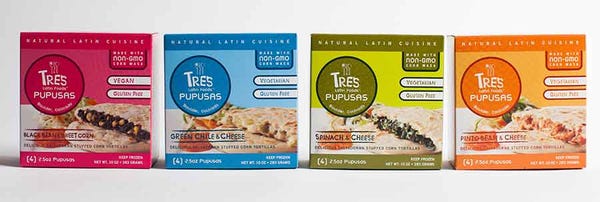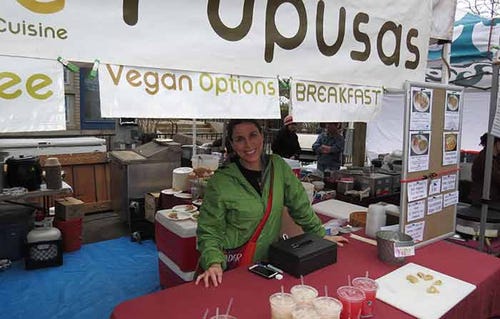From the Boulder Farmers Market to a national presence, Cindy English is taking Tres Latin Foods to new levels.
May 14, 2015

What was the inspiration for Tres Pupusas? How did the idea and company come to be?
I worked at the Boulder Farmers Market for Haystack Mountain Goat Dairy for a couple of years, and I saw a trend toward gluten free (everybody wanted cheese without the crackers!) Then, I tried pupusas for the first time at my kids' school during a Cinco de Mayo festival. Another mother at the festival was from El Salvador and she was making pupusas for everyone. I thought "Oh my God, these are the best things I’ve ever had," so, I asked her if she wanted to start selling them at the Farmers Market with me. Pupusas are naturally gluten free and, after my experience with Haystack, I thought people would love them.
Later, we hired three women from El Salvador to help out and to this day, they’re still working with Tres Latin Foods.
Fun fact: This was how we came up with the name "Tres." There were three ladies that started the company with me. I also have three children.
Was there a break somewhere along the road that helped get you to where you are today?
Our first year at the Boulder Farmers Market, Tom Rich, store manager at the Pearl Street Whole Foods Market [now regional vice president], stopped by our booth. His wife was with him and she loved the pupusas. When she saw that we sold them frozen she told him he should bring them into the store. So he came to me said, “If you ever want to be in the Pearl Street store, here’s my card.”
When I met Tom, I had just graduated from Naropa University with a master's degree in counseling psychology, so I was planning to go into the counseling field. But then I started working at the Farmers Market selling our pupusas, and that kept me busy. I felt like the universe was telling me, “This is what you’re doing right now.”
I recently saw Tom in Anaheim at Natural Products Expo West and told him, “You know that you started my whole business, right?” I give him 100 percent credit for our entry into grocery because I always thought this would be a hobby business at the Farmers Market.
 What has been your experience working in the natural products industry?
What has been your experience working in the natural products industry?

When I first started out, I didn’t really understand the grocery business, so I asked a lot of people for advice. Friends in the industry such as Tom Spier, formerly of EVOL foods, Koel Thomae of Noosa Yoghurt and Elisabeth Saucier of Zaza Raw, have all helped me. Many of us are on a similar path, so it’s been fun.
How did you first distribute your product?
For the first two years, I delivered all of our product myself. I didn’t really know what I was doing, so it was a learning curve. Then, I decided to go with a small distributor which really helped my company to grow. When I made the decision to go national and work with a co-packer, we signed on with UNFI to help distribute our product.
How did you find a great manufacturing partner? Did you ever run into any challenges together?
I was working with a consulting firm, the Red Idea Group, trying to decide whether to keep the company small or to increase production and go national. Since the grocery store side of my business seemed risky, I kept asking myself, “Do I really want to do this?”
But then, it just so happened that the Red Idea Group partnered with a new portfolio company, a co-packing facility in Denver called Natural Food Works. This seemed to be the answer I was looking for since we were given the opportunity to be their first client.
In the beginning, there were a few issues with the oven. It was kind of tricky to use, so for the first week or two there were some burn marks on the pupusas. But Natural Food Works is amazing and we sorted the issue out quickly. Now, I never need to go down there. They do a better manufacturing job than we could and they’re very professional. I know partnering with a food manufacturer can be a huge issue for some companies, but with Natural Food Works, it’s an open door. I can go down any time I want to check on our product. They’re even getting USDA certified so that we can start manufacturing products with chicken and pork.

Which certifications have you chosen for your product, and what have been the implications on supply chain and cost?
Right now, we’re looking into becoming certified gluten free, and then we’ll work on obtaining non-GMO certification for our vegan products. The issue we’re having is that it’s harder to certify cheese and dairy products as non-GMO than it is other ingredients, but we’ll go down that road in the future.
One of our motivating factors for using non-GMO ingredients is that people really care about our use of organic corn. Certified organic corn is the No. 1 thing that sets us apart from other pupusas on the market, because most other pupusas out there are made with conventional corn.
As far as costs and supply chain, we started using organic corn our second year of production and it doubled our cost. We had to raise our pricing a little bit, but we ate most of the costs and it’s paying off.
Is it challenging to get space in the frozen aisle?
It’s a challenge because there’s very limited space and a lot of bigger companies take up that space. But buyers love something new and innovative, and Latin food is growing, so that’s encouraging for our brand. Additionally, a lot of conventional grocers are talking about how they’re taking shelf space from conventional and converting it into natural and organic, which is awesome! They’re making space because natural and organic is what consumers want.
What has been your experience introducing a new product into the market? Do you need to educate consumers?
Yes. We spend a large chunk of our marketing money on demos. We try to demo all the time. We’ve found that once people learn what a pupusa is and try one, they love it. Even buyers don’t always know what pupusas are. I think more and more people are learning about different and innovative Latin foods. There are already so many burritos on the market…
When I think about our product, I always think about kombucha. When I started at Naropa University, who knew what kombucha was? Nobody. And now it’s everywhere. It just takes a little time, and I think Latin foods are the next trend. Just look at street tacos and street food in general. One of the top food trucks in New York City is a pupusa truck.

You May Also Like


